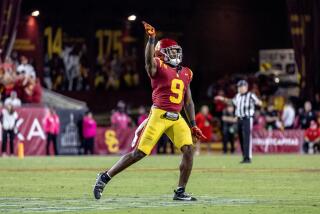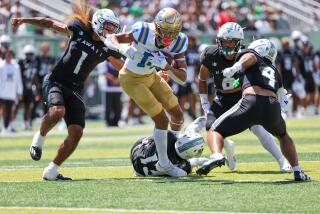White Able to Read It and Weep : Once a Struggling Crespi Student, He Sheds Tears of Joy When He Receives Cal Diploma
Russell White admitted beforehand that he would cry upon receipt of his undergraduate degree in social welfare from California.
The tears that came were not shed for the potentially big payoff the former Crespi High star missed by forgoing early entry into the NFL after his junior season. He fell from a probable first-round selection to a third-round pick by the Rams in April’s draft.
And his tears did not stem from a dismal 4-7 senior season, in which he missed the USC game and sat out parts of two others because of injury. He also watched his dreams of winning the Heisman Trophy as did his uncle, former USC star Charles White, quickly fade away.
Nor did White cry because of his discontent with Cal’s coaches, who he said pressured him when he missed practices last spring and fall to attend classes required for his major.
No, his joyous tears fell at the May 23 ceremony because he was handed his diploma, its conferral validating his widely applauded decision to stay in school as well as his own feelings of intellectual self-worth.
For White, whose admission as Cal’s first Proposition 48 athlete in 1989 sparked an uproar and who ultimately turned his academic achievements into a personal crusade against naysayers, the scroll served as a tangible ‘I told you so,’ to doubters, real or imagined.
“I’ve been heckled about not leaving, and how come I stayed,” White said. “It was for academic reasons; the same reasons I came here. And now that I set my goal to do something and achieved it, there’s no better feeling.”
That was evident in White’s exuberance at the commencement ceremony. The Cal sports information staff supplied a photographer to take pictures of White, decked out in cap and gown, the first such assignment that sports information director Kevin Reneau can remember.
Par for the course, it seems. White’s four years at Berkeley are replete with firsts.
White was a recruiting coup for Cal--the type of player who can add an immediate measure of credibility to an entire college program. He also was its first Proposition 48 athlete.
Coming out of Crespi, White had his academic life scrutinized as closely as his athletic one. After earning a 2.0 grade-point average at the parochial, all-boys private school, White failed to score 700 on the Scholastic Aptitude Test, which automatically excluded him from such schools as USC.
He struggled initially at Cal before his condition was diagnosed as dyslexia in the spring semester. He then began to flourish academically, for the first time drawing a parallel to his on-field success.
“I guess it’s like playing in a football game and the game is doing everything you want it to do,” he said. “It’s going the way you want it to go.”
The first time he touched the ball in a college game, he returned a kickoff 99 yards for a touchdown against defending national champion Miami. He led Cal to its first bowl game in 11 years his sophomore season, and as a junior, to the Bears’ first New Year’s Day bowl in 33 years. It was also Cal’s first 10-victory season since 1949.
After he rushed for 1,280 yards and 15 touchdowns as a junior, White envisioned a senior campaign in which he would become the first Cal player to win the Heisman Trophy, and the first Pac-10 running back to gain 1,000 yards in three seasons since Charles White in 1979.
But then the new Cal staff, led by Coach Keith Gilbertson, arrived in the spring of 1992 after Bruce Snyder’s departure. He and the new coaches were at odds from the outset over his academic needs, White said.
The problem: White had to miss practice time during spring football drills and during the season to attend classes required for his major.
“It was for my major so I couldn’t miss it,” he said. “(The coaches) didn’t quite understand that, coming from Washington, Washington State and Idaho.”
Gilbertson coached at Idaho from 1986-88 and then was an assistant at Washington before taking over at Cal. Running backs coach Tim Lappano was an assistant at Washington State from 1989-91.
“There ain’t no academic supremeness there,” White said, employing grammar that would provoke groans in Berkeley’s English department. “It’s not like Cal. Can you imagine walking up to a Cal professor and saying, ‘I have to miss your class to go play football’ ? You’d be stabbing yourself in the back right there.”
Cal’s Athletic Director Bob Bockrath downplayed any friction between White and the coaching staff.
“Russell came in under Bruce Snyder and had certain arrangements,” Bockrath said. “He had tutorial sessions and some classes that conflicted directly with regular practice time. There were a lot of places that would say, ‘You need to reschedule that tutorial or that class for another time because that’s when we practice.’ The concession we made was to put practice behind the tutoring and the class schedule to accommodate his academic needs.
“Keith wasn’t aware of any of those arrangements. So it was not so much friction as an adjustment period, with the two parties getting used to each other.”
Still, White’s perception of the issue as a conflict recalls his experience with Crespi. He criticized his high school experience after he enrolled at Cal, saying the faculty at the Encino school impeded his academic development by granting him grades he did not deserve. Crespi officials vigorously denied that assertion. White also blamed the school for its failure to detect his dyslexia.
White’s criticism of Crespi coincided with his newfound commitment to academics at Cal. When faced with a choice between athletics and studies, White is unwilling to compromise.
“I had to make a real decision,” White said. “Was I going to do what was best for me or was I going to let these coaches dictate what’s the future of Russell White?”
White stuck with his studies even though he feared that decision raised questions about his commitment to football.
“Scouts would come up and ask me, ‘How come you missed that practice on Tuesday?’ ” he said. “That’s when that thing came about: ‘He didn’t want to play football.’ That’s one of the reasons the pro scouts weren’t that high on me. I thought maybe these coaches are dogging me out. That really upset me.”
White’s senior season was also colored by the team’s disappointing showing. Despite the presence of 12 returning starters and a 3-1 start, the season soon spiraled downward.
“Personally, after I saw the team crumble, I started to set my own little goals,” he said. “I wanted to get at least 1,000 yards. I figured if I can’t win the Heisman like my uncle, I’d like to be in Pac-10 history, and I accomplished that goal.”
White rushed for 1,069 yards and nine touchdowns, joining Charles White and USC’s Anthony Davis as the only players in conference history to crack the 1,000-yard rushing mark for three consecutive seasons.
A strained hamstring--the latest in a line of nagging injuries--hampered his performance at the NFL scouting combine in February and doubts about his speed persisted.
The Rams may have gotten a bargain. In a recent mini-camp, White performed well.
“He showed exceptional hands, good quickness going into pass routes and good body control,” said Chick Harris, the Rams’ running backs coach. “He has all the characteristics of being a pretty good back--a darned good back.
“He weighed 216 pounds, and we’re going to work on getting him down a little, to 205. He seemed very receptive to that.”
White is unsigned, but Bill Duffy, his agent, said he will begin negotiations soon. Similar third-round draft choices last year signed contracts for roughly three years and $1 million, Duffy said, far less than the multimillion dollar deals for first-round selections.
But White’s diploma and his feelings of vindication and pride outweigh the lost money.
“He was stigmatized as someone they allowed to get into Cal as an athlete, and it bothered him,” Duffy said. “It’s an athlete’s mentality: If you’re doubted, you want to prove yourself. Someone didn’t think he could do it, so he took it personally. There’s a lot of vindication in his mind that he got his degree.
“I think it means more than anything he’s ever accomplished and I don’t think it’s even close.”
Cal Chancellor Chang-Lin Tien commended White for seeking tutorial assistance to help overcome a learning disability and earning his degree in four years.
“I think it sends a great message to other young African-Americans and to young athletes as to where our priorities should be,” Duffy said.
White relishes the thought of himself as a positive role model. He sees himself someday far from the spotlight that has illuminated his career, working as a high school coach (“not a college coach or a pro coach”) and sharing his experiences with youngsters.
But before he plots his future, there is time to savor his academic triumph.
“I’ve always been looking for this day to come,” he said. “I was just full of steam and had to get there. Now I feel like I can walk around the world and back. I just feel so big and so good.”
More to Read
Go beyond the scoreboard
Get the latest on L.A.'s teams in the daily Sports Report newsletter.
You may occasionally receive promotional content from the Los Angeles Times.






